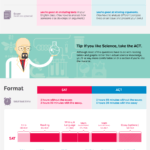
The choice between the ACT and the SAT is really tough, and most high school students wonder which side of this epic battle they should take. Both the ACT and the SAT are accepted by many universities in the United States and are taken by millions of students. In this post, we bring together all the best information about the differences and similarities between the ACT and the SAT to help you make this important decision.
ACT vs SAT Quiz
If you’re short on time, try our free quiz to get an answer on whether you should take the ACT vs SAT!
Test Format and Timing
The ACT takes 2 hours 55 minutes to complete without the essay and 3 hours 35 minutes with the essay. It takes 3 hours to complete the SAT (no essay). Now, let’s dissect how the sections and the order in which they appear are different on the ACT vs SAT.
Sections and Order
The ACT has four multiple-choice sections and an optional essay. Its sections are always presented in this order:
- English
- Math
- Reading
- Science
- Optional essay.
The SAT has four test sections. The order is
- Reading
- Writing
- Math with calculators not allowed
- Math section (calculators allowed)
Time Per Question
It is also important to note that one of the main challenges of the ACT is its time constraints. The majority of students struggle to complete at least one of the ACT test sections, and many students struggle to complete several sections within the time limit.
Still, the fact remains that every section of the ACT takes less time per question than the SAT. Overall, across sections, the ACT takes an average of 50 seconds per question and the SAT takes 1 minute 10 seconds per question. However, keep in mind that the questions from each test have different styles. SAT questions can take longer to analyze than the ACT questions and thus take extra time to complete.
Only the ACT Has a Science Section
The science section is specific to the ACT. There are no other standardized tests with anything similar to this, except those developed by the ACT organization.
Before jumping to the conclusion of whether you are good at science in order to judge whether you can do well on the ACT, you really need to know that there is very little real scientific knowledge tested in the ACT Science section.
You will see some questions that require you to bring in external knowledge, but most of them relate to your ability to read tables and graphs, make inferences about the scientific situation, and evaluate scientific hypotheses. Before making a decision on your capabilities for this section, it is recommended that you review the ACT Science video lessons or the examples of ACT Science questions on the ACT website.
Math Emphasis of Each Test
The SAT will ask you some questions about advanced math and trigonometry. However, the ACT seems to contain more questions in the areas of algebra II and trigonometry. But don’t panic if you haven’t studied trigonometry in either test. Knowledge of all trigonometry tested in either the SAT or the ACT is at a very basic level, and you can learn what you need to know in the SAT Trigonometry Learning Guide and the ACT Trigonometry Resources.
The SAT Has a No-Calculator Section
The SAT contains a 25-minute non-calculator section with 20 questions. The calculations here are designed to be easy to do by hand, but keep in mind that you may want to hone your mental math skills. If you can see and calculate a ton of math problems in your head, you may have an advantage in the SAT over many of your peers.
ACT Reading Passages are Longer
The ACT has four longer passages (700-900 words) and the SAT has five slightly shorter passages (500-750 words). In general, reading comprehension is a little more intense on the ACT than on the SAT, but the difference is mostly negligible.
ACT English vs SAT Writing and Language
If you take a look at the English section of the ACT and the Writing and Language section of the SAT, they appear to be virtually the same. Not only that, they test many of the same concepts. Arguably, these concepts are tested in a more subtle way in the SAT than in the ACT, and with more subtle answer choice variation. Still, it is important to note the difference in reading level between the tests and their approaches to the information graphic questions.
All passages in the ACT English section hover around a relatively low reading level (for example, about 9th grade). However, the text in the Writing and Language section of the SAT may vary in difficulty level from early high school to early college. In the ACT, all questions are about the given text. The SAT will also ask some questions about text-related tables and graphs.
The ACT Has an Optional Essay (ACT Writing)
As mentioned earlier, the ACT has an optional essay. The ACT essay offers three different perspectives on controversial issues and asks you to evaluate them and present your own perspective. Of course, for those who are good at discussing on the fly and coming up with supporting examples, it may be a good choice to write the ACT essay.
Different Scoring System
The ACT uses so-called composite scores to provide students with an overall ACT score. The overall composite score ranges from 1 to 36. You will also receive scores for each individual section ranging from 1 to 36, but with most universities, it is the composite score that matters. The overall composite score is the average of the section scores and is rounded to the nearest integer.
SAT scores range from 400 to 1600. Your overall score is based on a sum of your 200-800 Reading/Writing score and your 200-800 Math score. Note that the SAT has three major multiple-choice sections (Reading, Writing, Math), but Reading and Writing are grouped into one combined score out of 800 points.
If you take both the SAT and the ACT, how can you find out which scores you should send to your school or scholarship program? Don’t let different score scales confuse you! ACT to SAT conversion (and SAT to ACT conversion) is possible. This ACT to SAT conversion table makes it easy to convert the ACT scores to the SAT scores.
Different Test Dates
The SAT and the ACT alternate every month (except June, October and December). Both tests are offered seven times a year. Sometimes their schedules align so you can take the SAT and the ACT on consecutive weekends. Some students do that, but it’s not always wise. Would you want to spend two weekends at the test center and study for two different tests at the same time? Probably not.
In an ideal world, you would just have to choose one of the tests to take. After all, making this decision is the point of this post! If you do take both, it’s best to have at least a month (ideally more) between test sessions to switch gears.
Different Costs and Fees
The ACT usually costs $55 without the essay and $70 with the essay. The cost of the SAT is usually $52. There may be additional charges depending on the situation. Students who cannot afford to take the ACT or the SAT can often work with their high schools to get fee exemptions. This allows you to take the test for free (with or without an essay), but the fee exemption usually does not cover the additional charges.
Varying Popularity by State
The SAT remains popular on the East and West Coasts, while the ACT is a more popular test in the Midwest, although in recent years both tests have become established in areas where they were previously less popular. Currently, it is common for students across the country to take both exams.

The ACT vs the SAT: Which is easier? Which is harder?
The ACT may be easier than the SAT if:
- You work really fast. Usually, you don’t have any shortage of test time at school, and you’re a fast reader. The ACT is, in many respects, an even easier test if you have the speed to complete it in time.
- You like science and are good at interpreting data and trends. Earlier I told you that you don’t need to know a lot of science to be successful in the ACT Science section. This is still true, but it doesn’t hurt to be interested in what you are reading. Students who may not be science fans, but who are really good at seeing trends in graphs and tables and can guess the next steps in a logical process, can also succeed in the ACT Science.
- You are super reliant on your calculator in your math classes. You may find the SAT no-calculator section and the grid-in may be a little scarier than ACT math.
The SAT may be easier than the ACT if:
- You are not a fast reader, but a good reader. With enough time, you can understand what you read quite well. You may not be able to take all the time you want on the SAT, but you will encounter more complex passages on the SAT than on the ACT. This, coupled with slightly shorter SAT passages and a little more time to answer questions, can make the SAT a better choice.
- You are good at mental math. You can confidently get through the section without a calculator, while other students are stressing.
- You’re good at reading between lines and catching traps. The SAT isn’t as tricky as it used to be, but there are still some tricks. If you know how to play the standardized test game, the SAT should go well for you.






Leave a Reply